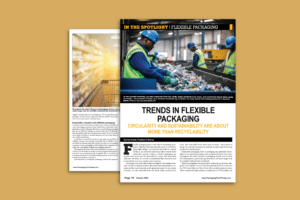Glenroy® was recently featured in the October Issue of Packaging Technology Today, with an engaging article titled “Trends in Flexible Packaging” on page 16.
“Flexible packaging plays a vital role in the packaging industry, offering numerous benefits such as versatility, lightweight design, and extended shelf life for various products. As consumer preferences shift towards more sustainable options, trends in flexible packaging are rapidly evolving to meet the demands for circular and sustainable solutions. However, it’s crucial to understand that circularity and sustainability are not as simple as just recycling.
According to the Ellen MacArthur Foundation, the circular economy is based on three principles: eliminate waste and pollution, circulate products and materials, and regenerate nature. In our current economy, we take materials from the earth, make product from them, and eventually throw them away as waste – the process is linear. In a circular economy, by contrast, we stop waste from being produced in the first place.
Sustainable packaging refers to packaging that gradually diminishes its environmental impact and ecological footprint over time. Throughout the entire lifecycle of packaging, factors such as fossil fuel consumption, greenhouse gas emissions, and water usage must be carefully evaluated and considered.
Flexible packaging is known to have reductions in all these categories. For example, a recent lifecycle assessment (LCA) conducted by PTIS found that our store drop-off recyclable zipper pouches, when compared to rigid canisters, result in up to 77% less plastic (by weight), 78% less fossil fuel consumption, 79% less greenhouse gas emissions, 65% less water usage, and 74% less landfill waste (even when factoring in plastic recycling rates).”

